The Ukaguru spiny-throated reed frog does not croak, sing or ribbit. Found in Tanzania’s Ukaguru Mountains for which it is named, Hyperolius ukaguruensis is among the few frogs around the world that do not vocalize to other frogs.
“It’s a very odd group of frogs,” said Lucinda Lawson, a conservation biologist and assistant professor of research at the University of Cincinnati.
“The male frogs don’t call like most other frogs do. We think they may use the spine as something like Braille for species recognition,” Lawson said. “Without a call, they need some other way to recognize each other.”
This group of frogs has only a few species, found in small populations that make them rare and at risk of extinction. Finding a new member of this group is a major win for conservation, Lawson said.
According to Lawson, finding a new member of this species is a great victory for conservation.
The newly discovered reed frog joins a family of nearly 200 species in the genus Hyperolius. Lawson said they immediately recognized they had found something special.
“Immediately it was clear that it was a spiny-throated reed frog. But this one was a golden, greenish brown instead of the green color found in the other species,” Lawson said. “Sometimes color variation doesn’t mean anything, but it might here.”
A combination of genetic and genomic analyses confirmed the frog was distinct from other members of Hyperolius. Researchers also identified its closest evolutionary relation, Hyperolius ruvuensis, another species that is critically endangered and is likely extinct.
Measurements found that the frog has unique body proportions, with smaller eyes in relation to its head than other spiny-throated reed frogs.
pll/lam/lpn










